You wake up, take time to brew your coffee, then sit down to enjoy the fruits of your labor as the sun rises.
But that first sip has you gagging as if you swallowed tar. “Why is my coffee bitter?” you wonder. “What did I do to deserve such agony?”
In this article, we look at what turns a good cup of joe bad and 6 different ways to ensure bitter coffee never happens again!
Why is My Espresso Bitter?
The first thing you may think when tasting bitter coffee is that it is too strong. But that’s actually not the case.
There are many culprits behind the bitterness. However, you’ll be happy to know that you can try different methods to fix the problem for future brewing success.
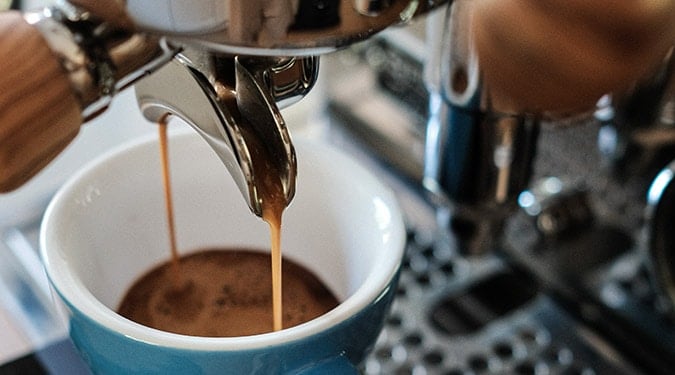
Here are the most common causes of bitter coffee:
Don’t worry. We’ll explain exactly how these issues affect your coffee and how to make coffee less bitter.
The good news is that you don’t have to sacrifice your favorite coffee beans for something else. Let’s dive in!
Coffee Tastes Bitter Reasons
1: The Coffee is Ground Too Fine
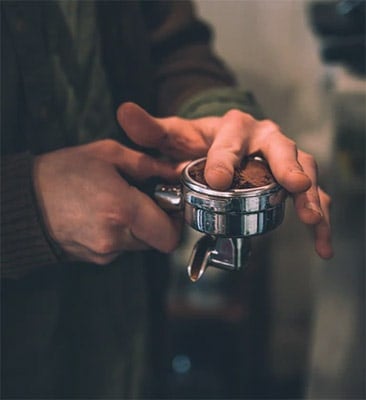
Everyone has their preferred grind setting, especially if you enjoy manually grinding fresh coffee beans and pulling an espresso shot yourself.
The tricky part is finding the right grind setting for your tastes. More often than not, if your coffee is too bitter, the grind may be too fine.
The science behind this is an over-extracted brew. The finer the grind, the longer it takes water to seep through the grounds. It’s a slower extraction process compared to using coarser grounds, resulting in a bitter flavor.
☕ How to Make Coffee Taste Less Bitter
To fix this issue, go ahead and change the grind setting on your coffee machine or manual grinder so the coffee grounds are a bit coarser.
If your coffee is still bitter, keep experimenting with different grind settings until you find the one that tastes just right.
💡 Pro Tip: A lot of times, coffee machines come with a recommended grind setting for the best results. Read your user manual to see if there is a recommendation from the brand.
2: The Water is Too Hot
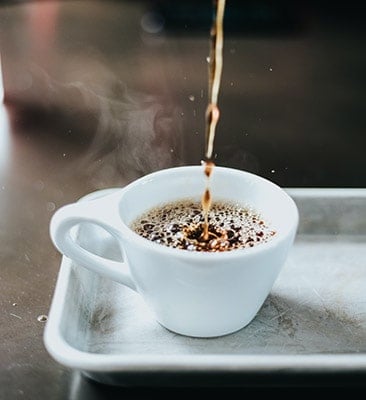
Your guilty secret may be that you like your coffee scorching hot, but that’s actually not the best way to brew coffee.
Whenever you pour boiling water over your coffee grounds at a temperature above 204°F (96°C), it forces the compounds to change too quickly, destroying the aromas and flavors of the beans.
However, you don’t want to use water that isn’t hot enough, or else the extraction slows to a point where the beans can’t reach their full flavor potential.
☕ How to Make Coffee Less Bitter
The optimal water temperature for a thorough extraction is between 194°F (90°C) and 204°F (96°C). You’ll also want to ensure the temperature stays consistent to enhance the quality of the extraction.
Most superautomatics come with the technology to handle this all for you. But if you have to do it manually, then an affordable solution is to invest in a barista milk frothing thermometer. This will give you more visibility and control with temperature consistency.
If you are on a budget, try letting the freshly boiled water sit for a minute before pouring it over your coffee grounds.
3: The Coffee/Water Ratio is Off
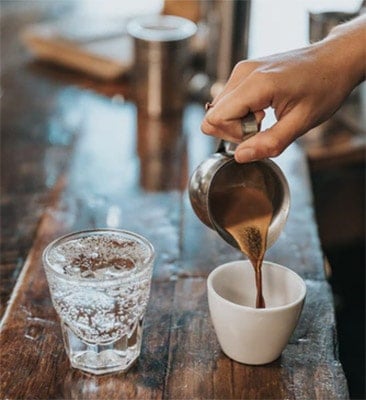
Is it possible for coffee to be both diluted and bitter? Yes, it is, and that’s due to the coffee/water ratio being off the mark.
When too much water is poured over ground coffee, it extracts the leftover compounds of the coffee that results in a bitter taste. But you can fix this easily. All you have to do is apply the golden ratio.
☕ How to Make Less Bitter Coffee
For 1-2 tablespoons of coffee, you should use 6-oz of water to brew coffee that is not bitter. This golden ratio is considered to be the ideal measurement for a flavorful, aromatic brew every time.
4: Low-Quality Coffee Beans
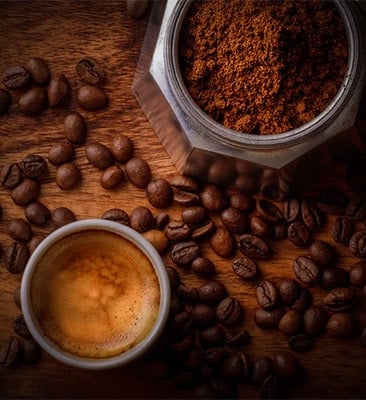
We did say that you won’t have to change out your favorite coffee beans for a new flavor, but if they’re stale or low quality, then you’ll probably thank us for the switch!
One of the reasons why your coffee is too bitter might be that your beans were not cultivated and harvested properly.
A lack of ideal growing conditions leads to low-quality beans that are often over-roasted to mask imperfections, leading to brews that taste ashy and bitter.
If you’ve been buying high-quality beans but still taste the bitterness, consider your storage method. Are the beans kept in an airtight container away from sunlight and heat?
These factors play a pivotal role in preserving bean freshness. If coffee beans aren’t stored properly—such as rolled up in the bag you bought them in—then you risk brewing stale coffee that tastes bitter.
☕ How to Make Coffee Less Bitter
If you’re buying the cheapest beans in the supermarket, go on and experiment with higher quality beans. Once you taste the difference, we bet you won’t go back to the cheap stuff!
If you’re not sure what to choose, there are coffee clubs that send members specialty-grade coffee beans to sample regularly. You’ll never have to worry about beans going stale (or getting bored of your beans).
To combat stale coffee beans, always transfer them to an airtight container after opening the bag. Opaque containers are recommended over transparent ones to avoid contact with sunlight.
Keep your beans stored in a cool, dry, dark place. Avoid cabinets above the stove, as the heat can damage them.
5: Your Brewing Equipment is Dirty
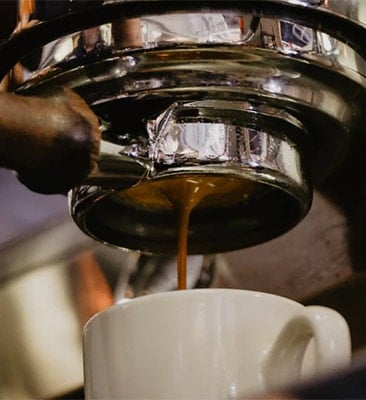
How long has it been since you last washed your coffee machine? Regular maintenance is one of the essential responsibilities of owning a coffee maker, not only because it ensures it will last for years to come but also to enhance the quality of the brew.
Over time, minerals build up from the water, used coffee grounds, and oils within the brewing equipment, which can transfer into your coffee, causing it to taste bitter.
☕ How to Make Coffee Less Bitter
Follow the instructions outlined in your coffee machine’s user manual to maintain the performance and brew quality.
Every machine is different, but generally, you’ll need to do the following:
💡 Pro Tip: Pure water enhances the flavors and aromas of your coffee much more compared to hard water. It also cuts down on the need to descale. Most coffee machines take a water filter but use filtered water instead of tap water.
6: The Coffee is Brewed for Too Long
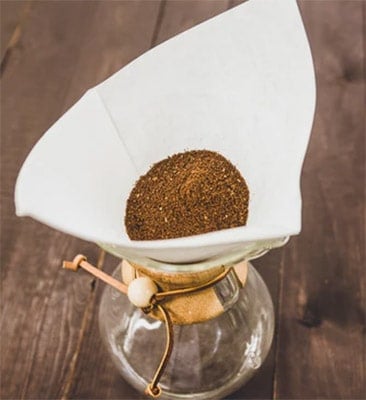
Brewing coffee for too long leads to over-extraction, which could be the reason for the bitter taste.
If you have bitter French Press coffee, this reason could be the culprit. Over extraction is common with this type of machine since users don’t remove the grounds after pushing the plunger down.
☕ How to Make Coffee Less Bitter
The solution? Check the back of your coffee bag to see if they recommend a brewing time. Another option is to bring your coffee beans to the local cafe for a barista assessment.
Why is My Coffee Bitter? Our Final Thoughts
There’s no secret to making coffee less bitter. When it comes down to it, brewing coffee is a science that takes patience, practice, and experimentation to get it just the way you like.
If you’ve tried all of the methods we outlined above and you’re still asking yourself, “Why is my coffee bitter,” then the final solution is to consider a bean to cup coffee machine.
These fully automatic models do it all for you—the measuring, grinding, and brewing—so you get a perfect cup every time without having to lift a finger.
REFERENCES & RESOURCES:
- How to Brew Coffee, NCA USA.
- Your Ultimate Guide to Different Types of Coffee, Taste of Home.
- Health Benefits of Coffee, Rush.
- What’s the Best Way to Store Coffee Beans?, Consumer Reports.
- How to Clean a Coffee Maker (and Why You Should Do It More Often), BHG.